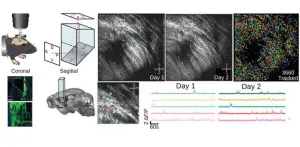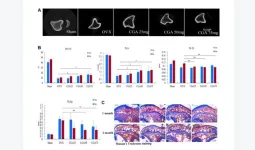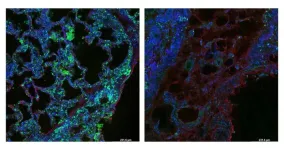(Press-News.org) Organisms constantly face the challenge of adapting their behavior to survive in a world full of uncertainties. This ability relies on complex neural circuits in the brain that help them find resources while avoiding danger. Scientists study how these neural circuits change over time to understand better how behaviors emerge.
One powerful way to study these changes is through optical imaging techniques that allow researchers to track the activity of individual brain cells. Traditional methods rely on observing the activity of cells directly, but this can be difficult when the activity patterns change over time. To overcome this challenge, researchers use techniques like fluorescence microscopy, which relies on special indicators that light up when cells are active.
A popular indicator used in this type of research is GCaMP, which lights up in response to calcium influx in the cells. Since calcium levels rise when neurons fire, GCaMP provides a useful way to track neural activity. By averaging the fluorescence over time, researchers can create a map showing where activity is happening in the brain.
These indicators can be excited using different types of light, with multiphoton imaging being particularly useful for capturing clear images of cells. However, multiphoton imaging has limitations, such as its shallow penetration depth into the brain, which restricts visualization to the outer layers of the cortex.
To overcome this limitation, researchers have developed techniques like using gradient-index (GRIN) lenses implanted in the brain to allow deeper imaging. These lenses focus light deep into the brain, enabling researchers to track activity in regions that were previously inaccessible. However, GRIN lenses have their drawbacks, including non-uniform imaging and distortion of cell morphology.
An alternative approach to calcium imaging involves using microprisms, which offer more uniform imaging but require specialized equipment to visualize deeper brain structures. Recent advances in microscope objectives have made it possible to use microprisms for imaging subcortical regions, opening new possibilities for research.
As reported in the Gold Open Access SPIE journal Neurophotonics, researchers at the University of Washington have developed a protocol for using microprisms to image deep brain regions, allowing them to track neuronal activity over multiple days with high resolution and throughput. According to corresponding author Professor Garret D. Stuber, “This approach represents a significant advancement in our ability to study how neural circuits evolve over time.”
By using techniques like fluorescence microscopy and innovative tools like microprisms, scientists are gaining new insights into how the brain adapts and changes over time. These advances are crucial for understanding fundamental processes underlying behavior and cognition.
For details, see the original Gold Open Access article by M. Hjort et al., “Microprisms enable enhanced throughput and resolution for longitudinal tracking of neuronal ensembles in deep brain structures,” Neurophotonics 11(3) 033407 (2024), doi 10.1117/1.NPh.11.3.033407
The article is part of the Special Section on Understanding of Neural Circuits with Neurophotonics, edited by Hiroshi Makino, Spencer LaVere Smith, Jennifer Li, and Drew Robson — currently in progress in Neurophotonics Volume 11 Issue 3.
END
Imaging deep brain activity with microprisms
Researchers push the boundaries of neuroimaging for understanding behavioral adaptations and dynamics
2024-03-26
ELSE PRESS RELEASES FROM THIS DATE:
Chlorogenic acid prevents ovariectomized-induced bone loss by facilitating osteoblast functions and suppressing osteoclast formation
2024-03-26
“[...] chlorogenic acid appears to be a promising candidate for the management of osteoporosis.”
BUFFALO, NY- March 26, 2024 – A new research paper was published in Aging (listed by MEDLINE/PubMed as "Aging (Albany NY)" and "Aging-US" by Web of Science) Volume 16, Issue 5, entitled, “Chlorogenic acid prevents ovariectomized-induced bone loss by facilitating osteoblast functions and suppressing osteoclast formation.”
Osteoporosis is a common bone disease in ...
Researchers identify protein sensor that plays a role in lung fibrosis
2024-03-26
Researchers at Weill Cornell Medicine have discovered a protein called SEL1L that plays a critical role in clearing collagen from tissue, and which may be a therapeutic target to help prevent fibrosis, scar tissue that interferes with organ function. The paper, published on Feb. 20 in Nature Communications, provides clues that could lead to drug development for diseases like lung fibrosis which have no therapeutic options currently.
Corresponding author, Dr. Michael J. Podolsky, assistant professor of medicine at Weill Cornell Medicine, has led a team that searched the human genome for genes involved in the ...
Johns Hopkins Children’s Center study shows negative impact of COVID-19 pandemic on youth minority mental health
2024-03-26
FOR IMMEDIATE RELEASE
Recent historical, political and public health events, most notably the COVID-19 pandemic, have collectively contributed to increased stress and mental health challenges among many groups of people — including adolescents in racial and ethnic minorities.
In a study published Feb. 1 in Academic Pediatrics, Johns Hopkins Children’s Center researchers investigated the pandemic’s effect on preexisting mental health disparities among youth, and found rates of depression, anxiety, and suicidal thoughts and behaviors ...
Researchers a step closer to a cure for HIV
2024-03-26
By 2030, the World Health Organization (WHO), the Global Fund and UNAIDS are hoping to end the human immunodeficiency virus (HIV) and AIDS epidemic. An international team of researchers led by Eric Arts, professor at the Schulich School of Medicine & Dentistry, and Jamie Mann, senior lecturer at the University of Bristol (U.K.), has brought us another step closer to meeting this goal, by finding an effective and affordable targeted treatment strategy for an HIV cure.
In a first, the study published ...
AI predicts the taste and quality of beer
2024-03-26
Leuven (Belgium) 26 March 2024 - Belgian scientists have developed AI models that can predict how a particular beer will be rated by consumers, and what aroma compounds brewers can add to improve it. The research was published today in the renowned scientific journal Nature Communications and may revolutionize how the food and beverage industry develops new products.
Tricky to compare
Comparing and ranking flavor profiles of different beers is a challenge. There are a multitude of guides on the market describing ...
A global map of how climate change is changing winegrowing regions
2024-03-26
Grapes grown to make wine are sensitive to climate conditions such as temperature and extreme drought. These effects are already visible worldwide on yields, the composition of grapes and the quality of wines, with already and soon-to-be-observed consequences on the geography of wine production. Understanding shifts in wine production potential due to climate change is a major scientific concern. Based on their expertise and a thorough analysis of the scientific literature — over 250 publications in the last 20 years – a research team has established a global map of evolving trends in the threats and potential benefits that climate change brings ...
SwRI’s Dr. Rohini Giles receives NASA Early Career Achievement Medal
2024-03-26
SAN ANTONIO — March 26, 2024 —Southwest Research Institute Senior Research Scientist Dr. Rohini Giles has received the NASA Early Career Achievement Medal. The medal recognizes unusual and significant performance supporting NASA’s mission during the first 10 years of their career. Giles was cited for “significant early career achievements in the analysis of Juno data to study Jovian Transient Luminous Events and the distribution of constituents in Jupiter’s atmosphere.”
“It’s ...
Sodium intake and cause-specific mortality among predominantly low-income Black and white residents
2024-03-26
About The Study: In this cohort study of 64,000 low-income Americans, nearly 80% of study participants consumed sodium exceeding the current recommended daily amount, which was associated with 10% to 30% of cardiovascular disease mortality. Public health programs targeted to reduce sodium intake among this underserved population may be beneficial.
Authors: Xiao-Ou Shu, M.D., Ph.D., of the Vanderbilt University School of Medicine in Nashville, is the corresponding author.
To access the embargoed study: Visit our For The Media website at this link https://media.jamanetwork.com/
(doi: 10.1001/jamanetworkopen.2024.3802)
Editor’s Note: Please see the ...
Exclusive breastfeeding duration and risk of childhood cancers
2024-03-26
About The Study: In this cohort study including 309,000 Danish children, longer duration of exclusive breastfeeding was associated with reduced risk of childhood B-cell precursor-acute lymphoblastic leukemia, corroborating results of previous case-control investigations in this field. To inform future preemptive interventions, continued research should focus on the potential biologic mechanisms underlying the observed association.
Authors: Signe Holst Søegaard, Ph.D., of the Danish Cancer Society in Copenhagen, is the corresponding ...
Ancient DNA reveals origin of racial/ethnic disparity in a childhood cancer
2024-03-26
There are 40% more Hispanic/Latino kids diagnosed with acute lymphoblastic leukemia (ALL) than white non-Hispanic/Latino children; actually, Hispanic/Latino individuals have the highest risk of ALL in the United States. However, the basis for this difference is not well understood. Researchers recently identified a genetic variant that accounts for the increased risk of B-cell ALL in Hispanic/Latino children, and using ancient DNA, they traced the mutation all the way back to the first migrants who ...
LAST 30 PRESS RELEASES:
Scientists show how to predict world’s deadly scorpion hotspots
ASU researchers to lead AAAS panel on water insecurity in the United States
ASU professor Anne Stone to present at AAAS Conference in Phoenix on ancient origins of modern disease
Proposals for exploring viruses and skin as the next experimental quantum frontiers share US$30,000 science award
ASU researchers showcase scalable tech solutions for older adults living alone with cognitive decline at AAAS 2026
Scientists identify smooth regional trends in fruit fly survival strategies
Antipathy toward snakes? Your parents likely talked you into that at an early age
Sylvester Cancer Tip Sheet for Feb. 2026
Online exposure to medical misinformation concentrated among older adults
Telehealth improves access to genetic services for adult survivors of childhood cancers
Outdated mortality benchmarks risk missing early signs of famine and delay recognizing mass starvation
Newly discovered bacterium converts carbon dioxide into chemicals using electricity
Flipping and reversing mini-proteins could improve disease treatment
Scientists reveal major hidden source of atmospheric nitrogen pollution in fragile lake basin
Biochar emerges as a powerful tool for soil carbon neutrality and climate mitigation
Tiny cell messengers show big promise for safer protein and gene delivery
AMS releases statement regarding the decision to rescind EPA’s 2009 Endangerment Finding
Parents’ alcohol and drug use influences their children’s consumption, research shows
Modular assembly of chiral nitrogen-bridged rings achieved by palladium-catalyzed diastereoselective and enantioselective cascade cyclization reactions
Promoting civic engagement
AMS Science Preview: Hurricane slowdown, school snow days
Deforestation in the Amazon raises the surface temperature by 3 °C during the dry season
Model more accurately maps the impact of frost on corn crops
How did humans develop sharp vision? Lab-grown retinas show likely answer
Sour grapes? Taste, experience of sour foods depends on individual consumer
At AAAS, professor Krystal Tsosie argues the future of science must be Indigenous-led
From the lab to the living room: Decoding Parkinson’s patients movements in the real world
Research advances in porous materials, as highlighted in the 2025 Nobel Prize in Chemistry
Sally C. Morton, executive vice president of ASU Knowledge Enterprise, presents a bold and practical framework for moving research from discovery to real-world impact
Biochemical parameters in patients with diabetic nephropathy versus individuals with diabetes alone, non-diabetic nephropathy, and healthy controls
[Press-News.org] Imaging deep brain activity with microprismsResearchers push the boundaries of neuroimaging for understanding behavioral adaptations and dynamics







